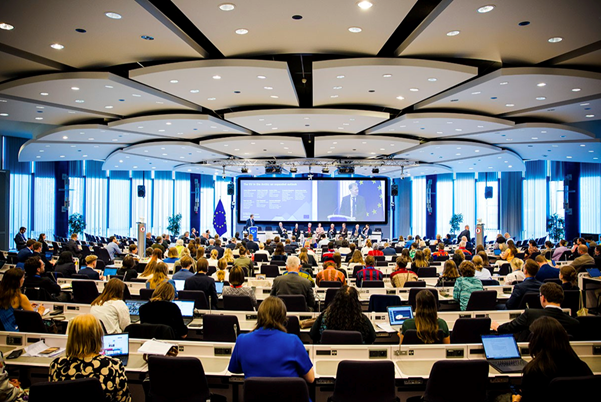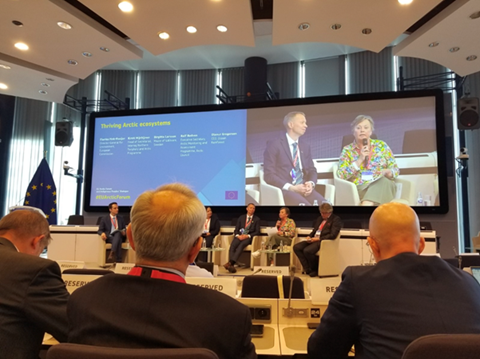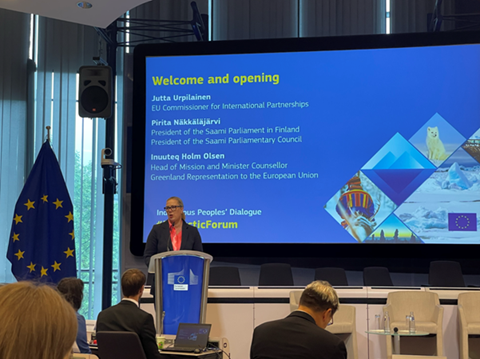This year's EU Arctic Forum and Indigenous Peoples' Dialogue in Brussels

On 14–15 May, the EU Commission and the European External Action Service (EEAS) hosted the EU Arctic Forum and Indigenous Peoples' Dialogue in Brussels. The first day brought together representatives from EU institutions, researchers, politicians and entrepreneurs to discuss EU Arctic policy, geopolitical tensions, climate change and sustainable regional development in the Arctic. The second day aimed to integrate and listen to traditional and local knowledge and the experiences of indigenous peoples and youth into EU policies and international processes.
This year's edition of the EU Arctic Forum and Indigenous Peoples' Dialogue took place in Brussels on 14–15 May. The high-level conference was organised by the EU Commission and the European External Action Service (EEAS). The Forum is held every other year in Brussels and every other year in the Arctic region. The Forum was established in connection with the development of the EU's Arctic policy which aimed to incorporate a greater focus on supporting regional development. In developing the EU's Arctic policy, northern Sweden, through North Sweden and the Northern Sparsely Populated Areas (NSPA) network, has been an active and important dialogue partner for the EU. In 2019, the first forum was held in Umeå at North Sweden's initiative and in collaboration with the Swedish Ministry of Foreign Affairs.
The main areas of discussion at this year's forum were, among other things, the EU's role in the Arctic, how to ensure sustainable development with respect and thriving communities, and more specifically the challenges posed by climate change, skills supply, infrastructure and Arctic research.
The EU Arctic Forum on day one
This year's Arctic Forum opened with a speech by Belén Martinez Carbonell, Director of the European External Action Service (EEAS). Carbonell emphasised the importance of a just and inclusive transition in a context where natural resources are local in nature with a geopolitical dimension, and where Sweden and Finland are now members of NATO, which means more military exercises and greater impact on nature and local populations. Carbonell also highlighted the role of the EU in the Arctic, explaining that the EU will not be able to solve all issues and that the ultimate responsibility lies with the governments, but that the EU is there to develop partnerships and cooperation, advice and risk analysis, as well as to provide funding through Horizon Europe and the Arctic Urban-Regional Cooperation programme (AURC).
The first panel of the day focused on the importance of international cooperation on Arctic issues with a growing interest in the region from countries outside the Arctic. The panel therefore brought together high-level representatives from both Arctic and non-Arctic EU Member States to discuss, among other things, the possibilities for strengthening European co-operation in the Arctic. From Sweden, Louise Calais, Sweden's Arctic Ambassador, participated, emphasising the importance of respect when decisions are made regarding resources, climate change, research and not least the geopolitical security situation. To exemplify how collaboration can contribute with important knowledge and perspectives to the EU that should be taken into account and to highlight the regions' opportunities and challenges, Calais mentioned the Northern Sparsely Populated Areas (NSPA) network as a great role model, which includes North Sweden.
NSPA was represented in the other panels during this year's forum. From Northern Sweden, Birgitta Larsson, chair of the municipal council in Gällivare, and Carina Sammeli, chair of the municipal council in Luleå, participated.
Similarly to Louise Calais, Birgitta Larsson emphasised the importance of cooperation and knowledge sharing to increase understanding and respect for the region and those who live there and depend on the area's resources. Larson said that it is important to keep these perspectives in mind when it comes to decision-making. This includes dialogues on the Arctic with stakeholders outside the geographical area.
- “We also need to work together with the EU, it is crucial that more than just those of us living in the North are aware of the challenges and opportunities facing Arctic communities. These dialogues are therefore very important," Larsson said.

Carina Sammeli talked about the challenges of skills supply in building a sustainable society and enabling the green transition. Sammeli also emphasised the importance of involving those who live and work in the area at an early stage in the decision-making processes, as they are an essential part of the solutions to the challenges. Whether it is research, industry or societal issues, the people on the ground are needed to implement the projects and solutions.
- “We don't need others to tell us what to do. We are working hard to enable the green transition, and we want it to be a just transition. We will make this transition possible, but we want to do it in a way that makes the everyday lives of the people living in these communities work and ensures that those who live here want to stay in the future. How do you do that? Talk about it." Sammeli said.

The second day and the Indigenous Peoples' Dialogue
The second day of the forum was opened by Jutta Urpilainen, European Commissioner for International Partnerships, who explained that indigenous peoples are greatly affected by climate change. Urpilainen also explained that they are working on supporting young people in Arctic regions. Shortly afterwards, Pirita Näkkäläjärvi, President of the Sámi Parliament in Finland, took the stage and explained that it is important for the Sámi population to be more included in decision-making processes in the EU, as decisions made at EU level affect the daily lives of Sámi communities. Furthermore, Näkkäläjärvi explained that they are working on three priorities towards the EU. Specifically, they want to include more Sámi population in the EU decision-making process, get more support from the EU, not least regarding climate change which affects the Sámi population significantly, and finally, to ensure that development is not imposed by industrial development on Sámi land, but also involves Sámi entrepreneurship in the transition that is underway in Europe and not least the Arctic region.

The importance of Arctic raw materials for the EU
Another topic touched upon in the panel discussions was raw materials in the Arctic. The panel included North Sweden's Director Mikael Janson as a participant. Janson said that the dialogue in Brussels is good, but the work must be done locally and explained that there is not one single indigenous perspective or majority view. There are many different conflicting interests with big industrial players in regions with little capacity of their own. We cannot say no to everything, and we cannot say yes to everything. Ultimately, it must always be in the interests of long-term sustainable local development, and that means involving all stakeholders in the dialogue. We will inevitably need minerals and forest biomass as part of the solution to the climate crisis. The EU is therefore pushing for more raw materials and green industries on the one hand and preserving nature on the other. Thus, the EU has an important role to play in building capacity for local dialogue and innovative solutions that address different interests.

In addition to Janson, Eirik Larsen, Head of the Human Rights Unit at the Saami Council, also participated. Larsen explained that without access to land, it is difficult to keep the culture and language alive. Therefore, Larsen believes that extra support is critical for the future. The EU's declaration on indigenous people was also discussed, which is a step in the right direction, but according to Larsen, it lacks implementation of regulations. An important part of this is that there is in-depth consultation with those affected before implementation.
During the panel discussions, the importance of recognising the cultures of Indigenous peoples and the knowledge and perspectives they possess was emphasised. It was also noted that support is needed to implement green and sustainable development for Indigenous communities and that there must be continuous dialogue between different parties to create an inclusive and just transition.
Photo first image: European Commission
